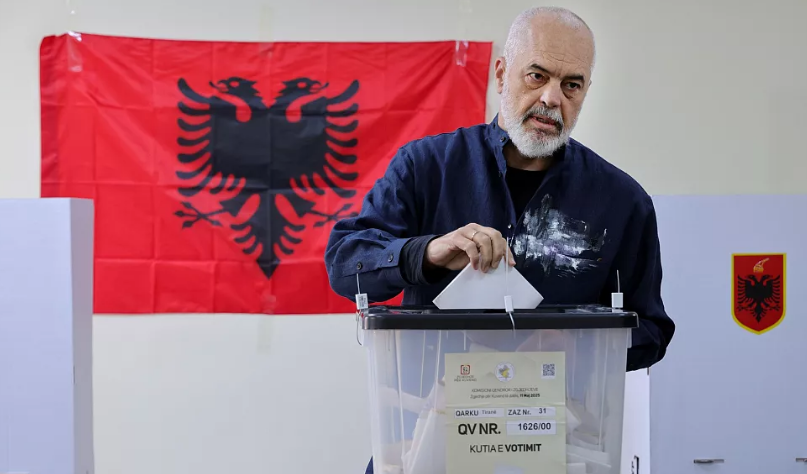Albanians went to the polls on Sunday in a closely watched parliamentary election that could hand Prime Minister Edi Rama an unprecedented fourth term in office. With a campaign built on promises of European Union membership and economic stability, Rama’s Socialist Party appears well-positioned to maintain power despite a contentious political climate and ongoing corruption concerns.
Rama, who has led the country since 2013, is facing off against his long-time political rival Sali Berisha, the 80-year-old leader of the conservative Democratic Party. Recent polls show Rama holding a commanding lead, though his party may still require support from smaller parties to retain its slim four-seat parliamentary majority.
The election marks a significant moment in Albania’s democratic development, with 3.7 million citizens eligible to vote — including, for the first time, members of the country’s large diaspora. Voter turnout was reported at just over 13% by 10 a.m., slightly lower than in the previous election. Polls closed at 7 p.m., with final results expected on Monday.
Rama’s campaign focused heavily on Albania’s path to EU membership. After securing the start of formal accession talks last October, the prime minister has promised full EU membership within five years. His party has emphasized recent infrastructure improvements, justice reforms, and steady economic growth — fueled by a booming tourism sector and stronger ties with the EU.
The World Bank projects Albania’s annual GDP growth to exceed 4% between 2022 and 2024, placing it ahead of many Balkan neighbors. However, widespread corruption remains a critical issue. EU officials, including foreign policy chief Kaja Kallas, have urged Tirana to press forward with anti-corruption and governance reforms to keep accession hopes alive.
Berisha, a former prime minister and president, has struggled to mount a strong challenge amid ongoing corruption investigations. He launched his campaign with a slogan reminiscent of Donald Trump’s “Make America Great Again,” later rebranded as “Grandiose Albania.” His campaign hired prominent U.S. Republican strategist Chris LaCivita, an advisor to Trump’s 2024 presidential run.
Despite Berisha’s combative rhetoric and long political history, internal party divisions and legal troubles have undercut his momentum. Critics argue that under his leadership, the Democratic Party has failed to present a credible alternative to Rama’s dominant Socialist Party.
As Albania awaits the official results, the election will not only determine the next government but could shape the country’s future direction — especially its long-sought integration into the European Union.


